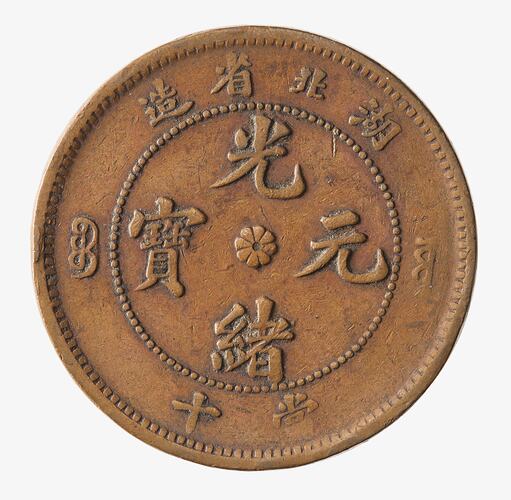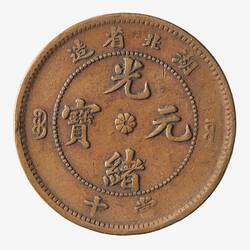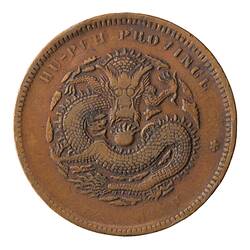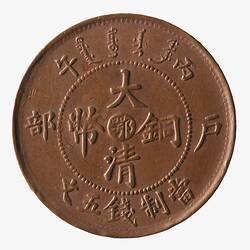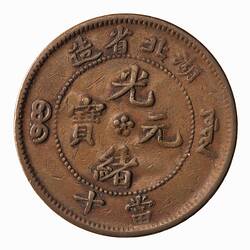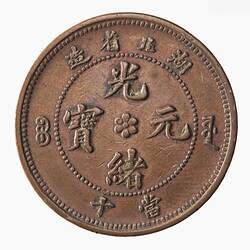Summary
10 Cash, Issued by Hupeh (Hubei), China, 1902-1905
Minted by Wuchang
Obverse Description
At centre, an eight-petal rosette, around within circle of beads four Chinese characters; around, outside circle of beads, 8 characters
Reverse Description
At centre, a dragon, facing; around above, HU-PEH PROVINCE; around below but not struck up, [TEN CAS]H
Edge Description
Plain
Significance
Modern equipment began operation at the Wuchang mint in 1895; prior to that the coins were cast. Wuchang is now part of Wuhan, capital of the Hubei (Hupeh) Province and is situated opposite where the Han River enters the Yangtze River. 4,475,000 of these coins were struck, this denomination was produced in between 1902 and 1905. Although nominally Emperor, Guangxu (Kuang-hsu) was under house arrest at the time these coins were produced.
The Annual Report of the Royal Mint, London for 1906 records of the Chinese 10-cash coin that, from all Chinese mints, over 10,000 million were in circulation. Earlier strikings were of low copper content though by 1905 a 95% standard was being achieved. The coins were only worth 3 or 4 cash but were forced into circulation at the 10 cash level. The number produced and the fact that they were not recieved in payment of taxes or government revenue saw them heavily discounted in circulation. On 22 August 1905 the Emperor approved a regulation that would establish a central mint at Tientsin (now Tianjin) with four branch mints at Nanking (now Nanjing), Tientsin, Wuchang and Canton (now Guangzhou). Expansion of all other mints was forbidden with an intention to close them when possible. The official banks were to watch money-changers and markets, with any attempt to raise or lower the value of the coins to be reported to the Board of Revenue or Provincial authorities. Reference: Royal Mint Annual Report 1906, pp.26-28
More Information
-
Collection Names
-
Collecting Areas
-
Acquisition Information
Donation from (Estate of) Mr Erich Wodak, John Gartner, 24 Jan 1983
-
Date Issued
1902-1905 AD
-
Issued By
-
Mint
-
Denomination
-
Series
-
Material
Copper
-
Axis
01
-
Classification
-
Category
-
Discipline
-
Type of item
-
Dimensions
28 mm (Outside Diameter), 7.07 g (Weight)
-
Shape
Round
-
References
Y#120
[Book] Bruce, Colin R. 2009. 2009 Standard Catalogue of World Coins 1901 - 2000., 411 Pages
